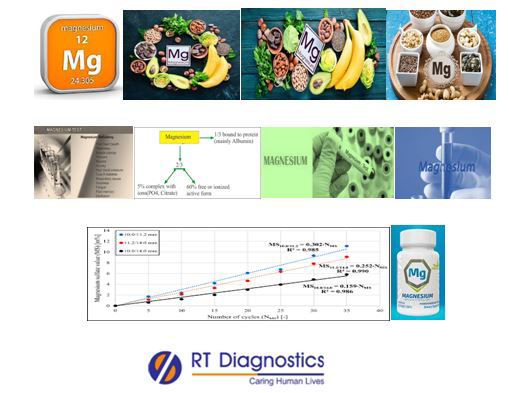Magnesium test:
Why Magnesium Test?
CLINICAL INFORMATION
Magnesium (Mg) is an essential nutrient, it acts as a cofactor for biocatalysts in many metabolisms in our body. Magnesium is present in legumes, green leafy vegetables, seeds, nuts, meat etc. Magnesium is an important component in the body’s electrolyte composition. Magnesium is involved in more than 300 enzymatic biochemical reactions and over 600 cellular reactions in the body. Magnesium is involved in the regulation of blood glucose levels and energy metabolism. It also aids in the body functions such as supporting a healthy immune system, oxidative phosphorylation, synthesis of DNA, RNA, antioxidants (glutathione etc), active transport of calcium and potassium ions across cell membranes, maintaining normal nerve (since magnesium is an integral part of NMDA and hence it is the gatekeeper for NMDA receptor) and muscle function like contraction (Magnesium helps heart muscles to relax by countering calcium), maintains the sodium-potassium pump enzyme (ATPase) that generates an electrical impulse, regulate steady heartbeat, protein synthesis, helps in bowel movement (easy movement of stools through the intestine), healthy bones etc. Magnesium homeostasis is largely controlled by the kidneys. Symptoms of magnesium deficiency include calcification of arteries, overstimulating the heart muscles can result in an irregular heartbeat (Torsades de pointes), insulin resistance, numbness, tingling, anxiety, depression, coronary spasm, cramps and spasm of muscles, anxiety, depression, constipation, hormonal imbalance, hypertension, fatigue, bone disorders (osteoporosis), premenstrual syndrome, discomfort in pregnancy, pre-eclampsia, loss of appetite, hypocalcemia, hypokalemia, phosphate depletion etc. Magnesium is used in the medication (eg. Magnesium Glycinate, Magnesium citrate, Magnesium aspartate etc or in combination with multivitamin tablets with minerals) of type-2 diabetes mellitus (Magnesium helps enzymes to regulate blood sugar and insulin activity), to improve a number of health markers (like BP, Blood sugar etc), CVD (regulates BP), depression (Magnesium assists in neurological pathways), bone disorders (Magnesium is a component of bone), treat migraines (prescribed as a complementary treatment), proton pump inhibitors, diuretics, calcium blocker, heartburn, stroke, antacids and laxatives etc. The magnesium test is a routine component in the electrolyte panel. Magnesium tests can be performed in blood and in the urine sample specimen as well. Serum magnesium in the blood sample specimen is performed if the suspected patient has signs and symptoms of low magnesium levels like muscle twitching, cramps, weakness, abnormal heartbeat etc. Low magnesium test results may indicate a condition called hypomagnesemia, which may present with seizures, digestive problems, mal-absorption, malnourishment, can be a sign of diabetes mellitus, chronic diarrhoea, chronic alcoholism, digestive disorders – IBD, lower levels in pregnancy might indicate pre-eclampsia, can be due to prolonged use of diuretics, can affect the changes in one’s personality etc. While high magnesium test result indicates hypermagnesemia, and it is associated mainly with kidney disease (kidney failure and oligouria – Low urine output), it may present with breathing trouble, cardiac arrest, Addison’s disease, dehydration, diabetic ketoacidosis, can result due to medication overdose eg. antacids and laxatives (signs of low BP and slow heart rate) etc.

General Instructions:
Sample Requirement: Specimen - Blood sample collected from the vein. Test Preparation: Fasting Required.
NOTE - Sample for specimen collections may vary based on the patient’s condition/cases according to the patient’s presenting complaints/signs or symptoms:
SPECIMEN REQUIREMENT (Special or Rare Cases) - As instructed and guided by Physician / Clinician / Pathologist / as per Laboratory’s requirements, according to procedures and protocols.
This Multi-Specialty Clinical Referral Laboratory RT DIAGNOSTICS provides precise and accurate tests with an extensive range of testing services to the medical centres to help in the diagnosis and identification of pathology in the test specimens for infectious diseases and also to evaluate the function of organ systems of the patient. It prevents further complications and helps to stabilize and restore health to near normalcy at the earliest without delay.



